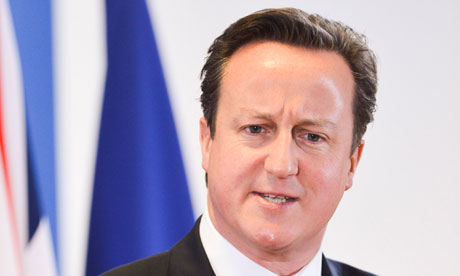
David Cameron has broken new ground on Europe by suggesting British withdrawal from the EU is "imaginable", aligning himself with the fiercely Eurosceptic Boris Johnson.
The prime minister stressed that he supported membership of a reformed EU, though he said Britain was "in charge of our own destiny".
Cameron, who is expected to set out plans next month for a referendum on British membership of the EU, has received a blow as polling shows that such a move is unlikely to impress former Tory voters who are expressing support for the UK Independence party (Ukip).
The new polling, commissioned by the former Tory deputy chairman Lord Ashcroft, found that only a quarter of those considering voting for Ukip list Europe as one of the top three issues facing Britain.
Downing Street hopes that a referendum will go some way to neutralising the threat from Ukip, which recorded 14% in weekend opinion polls.
Cameron highlighted the pressure from Ukip when he indicated to MPs that he could imagine life outside the EU.
Asked in the Commons by the Labour MP Gavin Shuker whether he could ever imagine Britain leaving the EU, the prime minister said: "That is not a position I support, so I do not spend my time thinking about it."
But he added: "Clearly all futures for Britain are imaginable. We are in charge of own destiny, we can make our own choices. I believe the choice we should make is to stay in the European Union, to be members of the single market, to maximise our impact in Europe, but where we are unhappy with parts of the relationship we shouldn't be frightened of standing up and saying so."
The remarks by the prime minister echoed comments at the weekend by Johnson, who has criticised Cameron and George Osborne for supporting moves towards greater political and economic integration in the eurozone. The London mayor told The Andrew Marr Show on BBC1 on Sunday that it would not be the "end of the world" if Britain left the EU, though that was not his preferred option.
Johnson said he would like a referendum to be held before the next general election, which is due to take place in 2015, on the "single market and a withdrawal from a lot of the nonsensical policies".
In a statement to MPs on Monday on last week's EU summit, Cameron ruled out "an immediate in/out referendum".
He is expected to pledge in the Tory manifesto for the 2015 general election that he would hold a referendum after using the next major EU treaty negotiations, which are likely to endorse moves towards a fiscal union for the eurozone, to repatriate social and employment laws to Britain.
Cameron, who will outline his thinking in a speech next month on Britain's position in the EU, told the Eurosceptic Tory backbencher Edward Leigh: "It is quite a slow process at the moment, but I believe that at some stage it will speed up radically. When we discover that we really do need greater elements of banking union, fiscal union and other co-ordination, a greater treaty change will be proposed within Europe, and I think that that will give us an opportunity to secure the fresh settlement that we want."
The prime minister joked with the veteran Eurosceptic Peter Bone that he hoped to please him in his speech. The MP for Wellingborough, who regularly invokes his Eurosceptic wife, said: "I am not sure that I will be able satisfy [you] or, indeed, the other members of [your] household, but I will try my best."
Cameron wants to move at a slow pace because he believes major revisions to the Lisbon treaty are unlikely to take place until after the German elections next year. But he is also constrained because Nick Clegg has voiced scepticism about the merits of trying to use a negotiation that is designed to save the eurozone to demand the repatriation of powers to Britain. The prime minister is expected to acknowledge in his speech next month that he will only be able to hold a referendum on the repatriation of powers if the Tories win a majority at the next general election.
Ashcroft today warns that the promise of a referendum may do little to neutralise the threat posed by Ukip. His research, which involved interviewing 20,066 adults last month, found that immigration was more important to "Ukip considerers" than Britain's relations with the EU. The research also found that half of all voters considering supporting Ukip voted Tory in 2010.
The report says: "An in-out referendum on the EU is not the answer to the question of how to win back potential Ukip defectors to the Tories. It may be the answer to a different question, but not to this one."
If Britain were to pull out of the European Union, the group would most likely fall apart. Organizations need a central power or they will end up like the League of Nations. Maybe Britain is trying to scare the EU into reforming, since all members know they need Britain.
ReplyDelete(Rachel B)
But of course, Britain is a powerhouse of the EU. Withdrawl would cause whats left of the economy in the EU to completely fail.
ReplyDelete-Maximilian Castelli
I think Britain is just, as Billy said, trying to convince the EU to reform. Cameron did say that he doesn't even think about dropping out. Withdrawal seems like an empty threat at this point, but it could be worth monitoring for the future.
ReplyDelete-Alex Canan
If Britain does pull out then the EU will fall apart,because they are the backbone of the union,and without them everything will become even more of a hot mess. They need to do what is best for their country.
ReplyDeleteAlisa F.